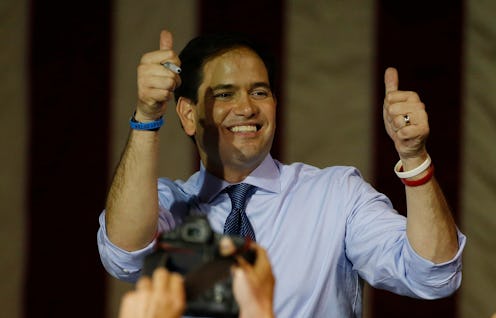News
There's A Technicality In Rubio's VP Dismissal
Vanquished Republican presidential candidate Marco Rubio posted a note on Facebook on Monday indicating that he isn’t interested in being the the party's vice presidential nominee. It’s not terribly surprising, given the well-documented animosity between Rubio and presumptive nominee Donald Trump. However, the phrasing of the note suggests that, contrary to some reports, Rubio hasn't actually ruled out being Trump’s vice president.
“While Republican voters have chosen Donald Trump as the presumptive GOP nominee, my previously stated reservations about his campaign and concerns with many of his policies remain unchanged,” Rubio wrote. “He will be best served by a running mate and by surrogates who fully embrace his campaign. As such, I have never sought, will not seek and do not want to be considered for Vice President.”
In just about any nonpolitical context, a comment like that would be pretty clear-cut. But in the world of presidential and vice presidential politics, there’s a universe of a difference between saying you’re not interested in a position and explicitly ruling out the possibility that you’d ever assume that position. Rubio “will not seek” and “do[es] not want" to be considered for vice president. But he never said he wouldn’t do it, did he?
The firmest possible way a politician can remove themselves from the running for a job is to deliver what’s called a “Shermanesque statement,” when they say something to the effect of: “If nominated, I will not run, and if elected, I will not serve.” The concept dates back to the American Civil War, and in general, it’s regarded as the only way for a politician to definitively rule out whatever job they’re being asked about. Anything less is considered a coy non-denial.
It may seem odd to say that anything short of this isn’t really a denial at all. But throughout history, a whole lot of politicians have said things like “I’m not interested in this job, and I don’t want it” right before they took the job. A recent example of this is Paul Ryan, who repeatedly denied that he was interested in being Speaker of the House. He said things like “I don’t want to be Speaker” and “I will not be a candidate” — but what he didn’t say is, “I will not serve as Speaker if elected.” Needless to say, Ryan was eventually elected, and is now serving as Speaker of the House.
Contrast this with what Ryan said when his name was floated as a dark horse presidential candidate earlier this year: “I do not want, nor will I accept, the nomination for our party.” That’s a classic Shermanesque statement, and it completely put the kibosh on all buzz about him becoming the nominee in 2016.
Rubio knows how this works. He’s well aware that he gave himself wiggle room with that statement, and it’s hard to imagine why he’d do that if he truly was, in his heart, ruling out the possibility. Whether Trump would actually ask Rubio to be his running mate, and what sort of terms they’d reach regarding their candidacy if they ran together, are different questions entirely. But make no mistake: Rubio is still very much in the running for vice president.
